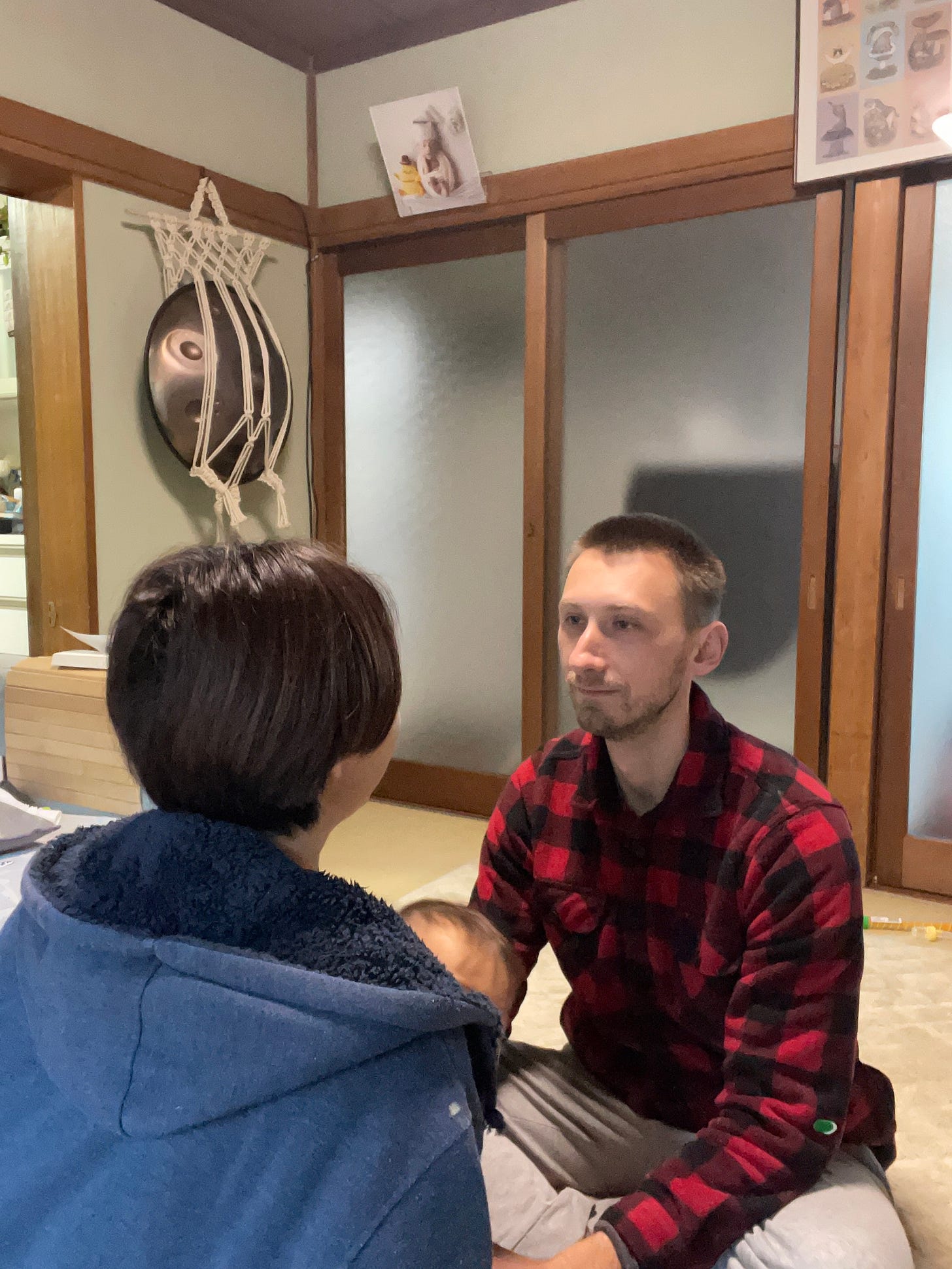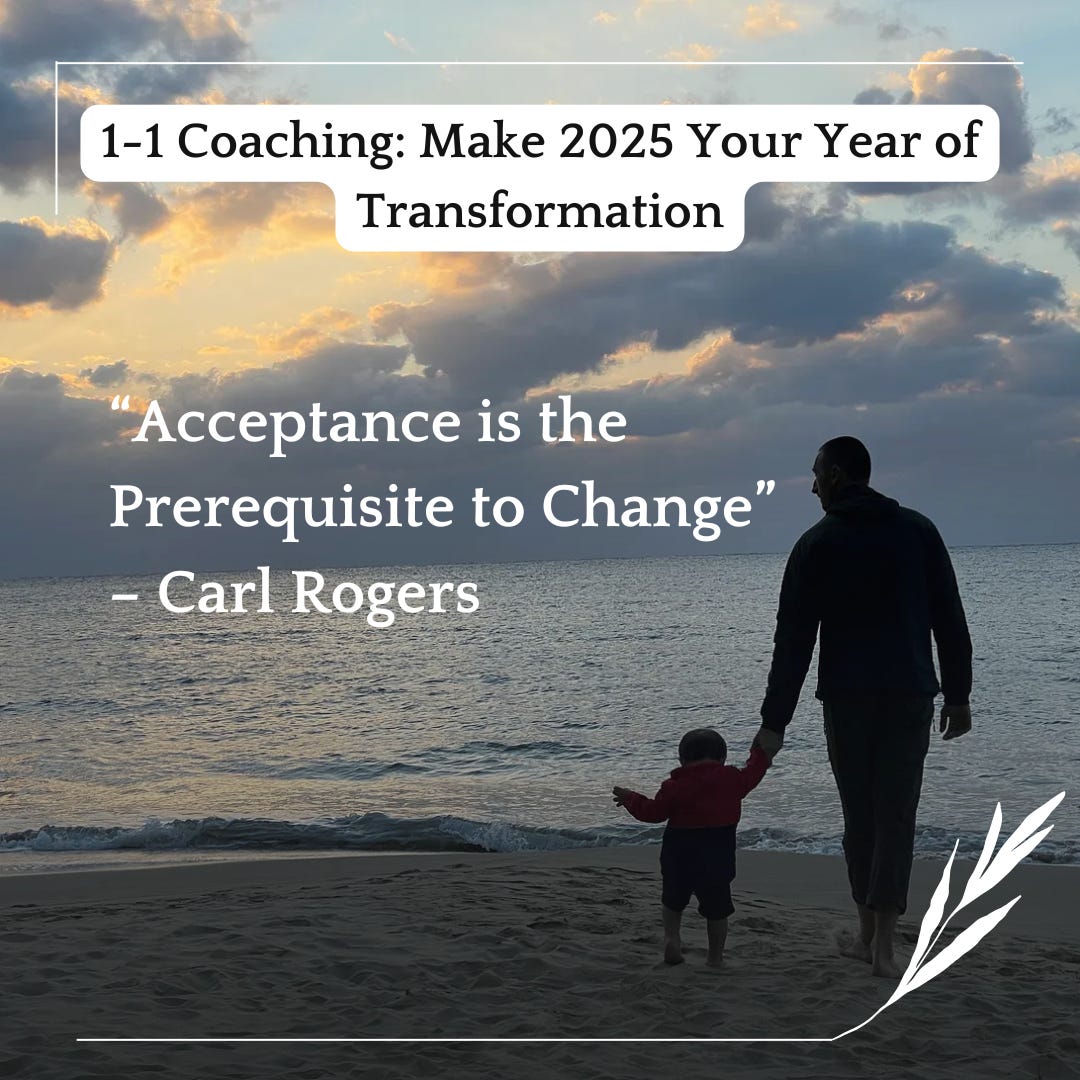5 techniques I use to deepen intimacy with my partner
trust, communication and growth over a decade
I’ve been together with my partner for ten years now. Like anyone in a relationship this long, we’ve had our fair share of ups and downs. Navigating communication styles, cultural differences, personality differences, health challenges, personal traumas, generational traumas, finding our paths, moving across the world, and raising a kid. You know, the usual stuff.
The last few months have been really beautiful as we have watched our baby boy grow. A child has brought up new challenges, yet it feels like we have laid a strong foundation over the years. The inevitable waves are ebbing and flowing but underneath there is a trust, support and playful curiosity with each other.
The more that we feel we can depend on each other, the more free and relaxed we feel to be ourselves. This is the paradox of dependency. The emotional work I do to heal past wounds creates cascading effects that make me feel more secure. This love is growing and evolving.
But what is love? “Love” in our society is seen as a passionate, romantic feeling that pulls you in different directions. This is a one-sided way to think about. It’s so much more than that. I like the definition by Bell Hooks in her book All About Love. She describes love as,
"the will to extend one's self for the purpose of nurturing one's own or another's spiritual growth."
This resonates with me. The catalyst for spiritual growth is unconditional love.
Deep spiritual work isn’t just done on a mountain somewhere in India; it’s often done in relationship with others. Those closest to us activate the most trauma and reactivity because they mean the most to us – and this comes with all sorts of attachment. So it makes sense to invest ample time in relationships.
But we are hardly present with each other. Our definition of “deepening our relationships” is watching Netflix at night, having a vacation or going to a party. That doesn’t cut it (although we do all three, too). Even when we’re at dinner or talking, are we really there? Or are we scrolling on our phones, planning what to say next, or bored because we think we know them so well? There has to be an intentional creation of space and turning-towards what is not being said. Otherwise, things fester and relationships erode. No wonder the divorce rate is 40-50% in most countries.
This process of turning-towards your relationship challenges is not easy. It’s much easier to avoid, distract, and suppress. It takes a lot of practice and courage to unwind those patterns. It’s especially hard when you don’t have a good model for it. You have to seek out new ways of being. Experimentation for us is an ongoing process and we have have built it into our lives after many years. For now I wanted to share five practices that have been useful in our relationship so far:
1/ Morning Partner Stretch and Eye Contact
The last few months we were feeling like mornings were rushed. We’d wake up, make breakfast, feed our son, and then my wife would be off to work and our son to daycare. Starting the day like this felt chaotic but perhaps unavoidable. It was hardly a time to connect with each other.
I questioned this and proposed to spend a little more time together being present. We decided to slow things down and do a series of partner stretches that we found in a yoga book. Stretching is good for both of us so why not do it together? This takes about 15 minutes or so.
We started this in the last month and have been really enjoying it. Our son usually jumps on top of us and joins in stretching, so we’ll have to pause a little bit and play with him, and then go back to stretching.
For the last minute we do an eye-gazing practice. We simply look at each other, usually without talking. Sometimes nothing comes up, but sometimes it brings up a feeling to express. “I am feeling a little bit worried or disconnected” or “I’m excited about this” or whatever. This sparks conversations and clears the air.
It’s really simple and nothing fancy. We have no expectations to have any deep conversations. We simply allow for the space to be there in the morning, otherwise we would be rushing. I’ve been enjoying it and find that the day flows much smoother when you start it by connecting at the heart-level.
2/ Speaking The Good and the Bad
Communication breaks down when two people are unable to speak the truth. Often, truths are scary because they can be hurtful when they involve the other person. We want to uphold an image of being a certain way – kind or compassionate – and do not want to create more tension, drama, or suffering. So we say nothing.
For example, I would feel anxiety or insecurity that my wife did/didn’t do something. Speaking this truth feels like a complaint, or maybe that I am over reacting. Better to just “deal with it myself” and not tell her. As a result, the tension builds up in my mind. I feel further disconnected from her. I become more reactive and distant. I try to suppress it by going to the gym or complaining to a friend.
These methods rarely worked. Thoughts would continue to spiral and it would create a vicious cycle, pushing me further away from her and deeper into my own story-telling. The problem is that people don’t deepen a relationship by holding things back. They do so by being vulnerable. I open my heart, and as I do, I still have past wounds that are afraid of rejection. And that takes courage, because it is risky.
But even if the conversation leads to conflict and the experience of some rupture, this leads the path to finding a way to repair that rupture. Of course I don’t have to express myself immediately. It is true that some things can be resolved internally, on your own – or sometimes with the help of a friend, coach or therapist. At first I turn towards myself to check in with what I am feeling before expressing raw emotion. There is a healthy way to do it!
What helps: learning to be okay with sharing both happy and more challenging feelings. “Good” and “bad” are actually judgments and never really the case; the ‘bad’ ones that are more emotionally charged tend to have the most gold underneath! Normalizing this in the relationship is important, otherwise one of us/both of us can get stuck in our own loops. So we make it okay to share whatever is in our mind, without worrying about “killing any positive vibes.”
In communicating it is helpful to use language like, “a part of me feels like this,” or “I’ve been feeling this tension in my chest around this issue.” Training in mindfulness/somatic practices help. Make sure not to blame the other person or judge/diagnose the issue. Learning how to communicate this in a nonviolent and healthy way makes it easier for the other person to receive.
3/ Softening Expectations
Often people expect their partner to be everything for them. A good friend, partner, lover, therapist, cheerleader, economic adviser, better half, etc. This is unrealistic and leads to all sorts of frustrations. I am not sure where we got this idea from. But it’s unlikely that one person can meet all of your needs! I’ve found it important to diversify activities and soften expectations.
For instance, there are hobbies I enjoy that my wife doesn’t. She won’t join me on a 12-hour hike or in an improv comedy class because it’s just not her thing. That’s okay. I pursue these interests either alone or with friends. She enjoys playing the handpan, and I like the ukulele. She reads manga; I prefer sci-fi novels. This difference is healthy.
Sometimes, when I’m passionate about something I think she might like, I’ve learned that pushing it on her usually meets resistance. The best approach is to simply enjoy it myself and share my experiences without any expectations. This often piques her interest naturally, like when I signed up for a singing class, and she eventually joined and loved it.
It’s been a long journey to let go of these expectations—and the journey continues.
4/ Weekly Check-In over Dinner
We were just moving from overseas back to Japan, trying to have kids, and readjusting to a new way of life. I was dealing with my own health issues which added another layer to this. Tension seemed to be building and it felt like communication was breaking down.
Still learning how to communicate with each other, we decided to put structure to this process. Every Sunday over dinner we would talk about how our week went. Specifically, we would share:
1) how we were feeling over all
2) one thing we were grateful for that the other person did
3) anything that was difficult for us and/or “requests” we have of the other person
This first question would be like a catch up and summary, which felt nice to express. The second question would be really nice because we are expressing our love to each other explicitly – and doing it in a specific way, which has the most impact. The third question would inevitably spark the most conversation as it centered around strong emotions or needs that were not being met.
Putting structure to it created consistency. What we found over time is that we didn’t have to wait to give the feedback, or share our gratitude or unmet needs.
Over time it has become a “way of being.” We no longer do the ‘formal’ check-ins, but just express ourselves throughout the day when it is timely. Other times it might come up during a walk or during our morning eye gazing.
5/ Evening Conversations w/ No Media
For a while I had tied sex to intimacy, as I think many guys do. But that’s not happening every day, and so it almost began to feel like I was either having sex or waiting to have sex. Two modes of being and lots of suffering. This stemmed from a deep insecurity and believing I could not connect deeply in other ways.
In order to have a loving, sustainable relationship, I had to move past this. I had to seriously question what I enjoyed doing with my partner. Was it as simple as taking a bath together, or maybe we needed to spend more time apart so that we could keep the fire burning? I experimented, keeping a close watch on my own response and happiness level.
I found that it wasn’t that complicated. The more that I was able to be open, free, and expressive around my partner, the more connected I felt. Having conversations about whatever – rather than the ‘practical stuff’ we all need to get done – is usually enough for me to feel really connected. Simple, I know.
One of the ways we do this now is to (occasionally, not every day) spend time together in the evenings when the baby is asleep. Without watching tv, we talk about whatever and share what is on our minds. Honestly, sometimes it’s just talking about my day. Nothing planned beyond the space and time to listen and be heard.
Summary / Action Points
These are just a few of the ways that we’ve found effective to deepen intimacy and trust. Here are some action points to consider if you want to bring this into your relationships.
Have a conversation with each other about where you’re happy/unhappy in the relationship — with zero expectations for that person to fix anything or resolve you problems. Make the intention simply to BE with each other and share, rather than fix or strategize. Give this conversation air and space for a few days. Do nothing, simply share your truth.
Find a way to connect at the heart-level every day, even if just for one minute. It doesn’t have to be eye contact or partner yoga. Make it a routine together to pause, intentionally, and do something that you enjoy that brings you together. Without scrolling on your phone. You could simply ask each other every day, “how are you feeling?” and give each other the space to talk for one minute. Put it in the calendar so both of you know it’s for real.
Look inwards and ask yourself: what am I not expressing right now? Throughout the day, notice resistance or tension you have to behavior or words they are saying. If the same thought is occurring daily in your mind, that is a sign that you have probably suppressed something. Consider sharing something difficult with your partner, but do so with the language of “I feel this way” rather than blaming them. Make a game out of it: “you share one hard thing, and I share one hard thing.” The more open you can be with each other, the deeper you will grow.
Take stock of any expectations in the relationship — can you make explicit what roles you want them to play in your life? Consider sharing those needs with them, but be ready to accept that they cannot meet all of your needs. Notice when you say the word “should” in your relationship. In fact, go a month without using the word should. Here are a list of feelings and needs to get you started.
Self-knowledge: You might consider reading books on Attachment Theory and learning about relationship dynamics, so that at least one or both of you can understand patterns that are emerging or driving the relationships. Do not try and push anything on them — focus on sorting through your own beliefs and trauma.
Create a weekly check in with each other. Make it your own and decide what you want to include. This should come from both sides. It could include sharing 1 thing you’re grateful for, one thing that was difficult, and one request that you have of that person. Or, just leave the requests out, and share the feeling and need.
Please share your comments and if you have other approaches that have worked in your relationships!
Thank you for reading :)
We spend a lot of time stuck in habits and patterns that aren’t contributing to our personal growth or happiness. We are aware of this but don’t know how to get off the treadmill. Despite our best efforts, our hearts stay closed and reactive.
This year, make the shift you’ve been longing for. I offer 1-1 coaching to help you get unstuck, deepen your presence, and find alignment on your spiritual or healing journey. My approach blends Western and Buddhist psychology, rooted in self-compassion and finding your inner wisdom.
Ready to begin? Drop me a message and let’s chat.
Testimonials:
“Misha is a chiropractor of the mind-soul.” - E. Carr
“After only two sessions, I felt like his guided meditations went deeper and uncovered more about myself than hours of behavioral therapy did.” - J.N.
“I feel like I can accept myself and others just as they are. 🙏” - Marina






